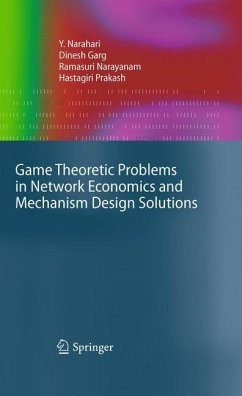With the advent of the Internet and other modern information and communication technologies, a magnificent opportunity has opened up for introducing new, innovative models of commerce, markets, and business. Creating these innovations calls for significant interdisciplinary interaction among researchers in computer science, communication networks, operations research, economics, mathematics, sociology, and management science. In the emerging era of new problems and challenges, one particular tool that has found widespread applications is mechanism design.
The focus of this book is to explore game theoretic modeling and mechanism design for problem solving in Internet and network economics. It provides a sound foundation of relevant concepts and theory, to help apply mechanism design to problem solving in a rigorous way.
Hinweis: Dieser Artikel kann nur an eine deutsche Lieferadresse ausgeliefert werden.
The focus of this book is to explore game theoretic modeling and mechanism design for problem solving in Internet and network economics. It provides a sound foundation of relevant concepts and theory, to help apply mechanism design to problem solving in a rigorous way.
Hinweis: Dieser Artikel kann nur an eine deutsche Lieferadresse ausgeliefert werden.
From the reviews: "The book consists of six chapters. ... This is one of the first monographs that deals solely with algorithmic mechanism design. ... it will be useful to researchers in computer science, operations research, e-commerce, and multiagent systems. The book is also suitable for an advanced undergraduate or graduate-level course in computer science and operations research. ... In any case, the book will be a valuable resource for academics and researchers." (Haris Aziz, ACM Computing Reviews, April, 2009)
"The book consists of six chapters. ... This is one of the first monographs that deals solely with algorithmic mechanism design. ... it will be useful to researchers in computer science, operations research, e-commerce, and multiagent systems. The book is also suitable for an advanced undergraduate or graduate-level course in computer science and operations research. ... In any case, the book will be a valuable resource for academics and researchers." (Haris Aziz, ACM Computing Reviews, April, 2009)








